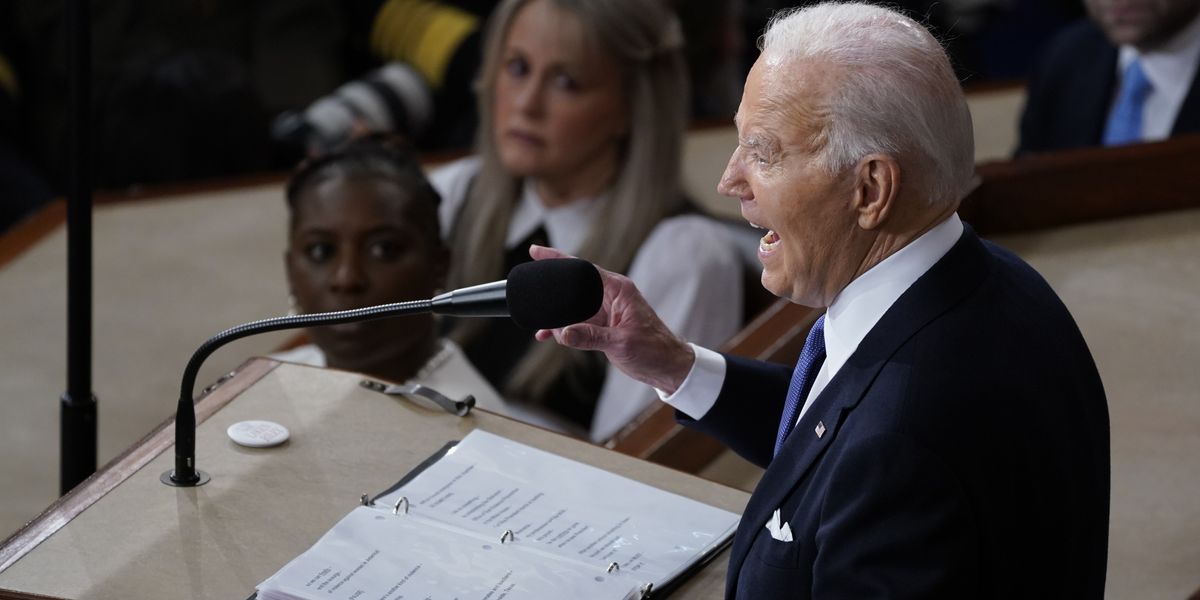UPDATE 3/9: The Pentagon said Friday that the effort to establish a maritime corridor from Cyprus to Gaza and a temporary pier to surge humanitarian aid to Palestinians there would require more than 1,000 U.S. forces between the Army and Navy. DoD spokesman Pat Ryder said the operation will take about 60 days to build out and would include elements of the 7th Transportation Brigade (Expeditionary) from Joint Base Langley-Eustis in Virginia, plus a mix of other units and ships that have yet to be identified.
Biden got much more hearty applause Thursday from repeating his shopworn lines about Vladimir Putin marching from Ukraine and into Europe than for announcing a new port to surge “a massive increase in the amount of humanitarian assistance getting into Gaza.”
The president had very little to say about foreign policy in this year's State of the Union. While this might be no surprise, the fact he raced through his boilerplate about Putin (“If they think Putin will stop at Ukraine I assure you he will not”) and pushing for Ukraine aid (“Ukraine can stop Putin if we stand with Ukraine and provide the weapons that it needs to defend itself”) at the beginning of his speech, and didn’t get to the other major live war — Israel-Gaza — until nearly the end, was a bit odd.
But the reception to both couldn’t have been more different, with the latter receiving a more restrained reaction. We can only guess that to the fervidly pro-Israel members of Congress, the idea that the president noted that “this war has taken a greater toll on innocent (Palestinian) civilians than all previous wars in Gaza combined” in the same breath as he spoke about the Israeli hostages and the Oct. 7 attacks was an insult. Conversely, to the members of Congress who have been pushing for a permanent ceasefire, his call for “an immediate ceasefire that would last for at least six weeks,” I'm sure sounded weak and stage-managed.
As did the idea of the construction of a “temporary pier in the Mediterranean on the Gaza coast that can receive large ships carrying food, war, medicine and temporary shelters … and ensure that humanitarian workers aren’t caught in the crossfire.”
First, to many this smacks of a campaign stunt — even Politico reported Thursday that there are no concrete plans in place and the operation won’t, at least for now, include Navy ships actually designed for humanitarian response. As QI’s Trita Parsi said to me, “the operation to build a temporary port in Gaza is not only costly and time-consuming — it will take at least 60 days before it can be used to get food in, at which point thousands will already have died by starvation — but it also shows the lengths Biden is willing to go to avoid the most obvious and effective solution: a ceasefire and an end to the war.”
Biden says “we’re not waiting for Israelis” but he seems to be ignoring that the issue hasn’t been the amount of aid but the Israelis holding it up at the border and the bombing, shelling, and sniping by Israeli Defense Forces keeping trucks and aid workers from getting to where they have to go once inside.
Biden says “no American boots on the ground” yet assures trucks won’t be caught “in the crossfire.” How does he do that, actually, without security and not “waiting for Israelis” to clear the path? Well, Barak Ravid of Axios reports that Israel apparently “welcomes & fully supports the deployment of a temporary dock to facilitate further humanitarian aid to Gazan civilians. The initiative has been discussed by U.S. and Israeli officials, and will be carried out with full coordination between the two parties.”
That’s where the stagecraft comes in. So this isn’t about a president finally dishing out tough love but getting a bone from the Israelis to placate a domestic audience — a pledge that may or may not be fulfilled in reality? Time will tell.
But as the SOTU “Stop Sending Bombs” signs solemly held up by Reps. Rashida Tlaib and Cori Bush declared, most of the people there who would welcome a humanitarian surge the most are keenly aware that it is U.S. weaponry causing the brunt of death and destruction inside the strip today, and Biden is unwilling to stop that particular gravy train from rolling in. In fact, he has been sending it all along without Congressional approval.
Biden delivered his lines on Gaza expecting rousing appreciation. I’m sure he got what he felt was needed, but to this ear, having heard more excitement Thursday night over Biden’s “chipflation” outrage, it was all a bit “low energy.” And with good reason.
- Biden says he's pushing a 2-state solution. Let's put him to the test. ›
- Mission creep: Will pier become a beachhead for US in Gaza? | Responsible Statecraft ›















